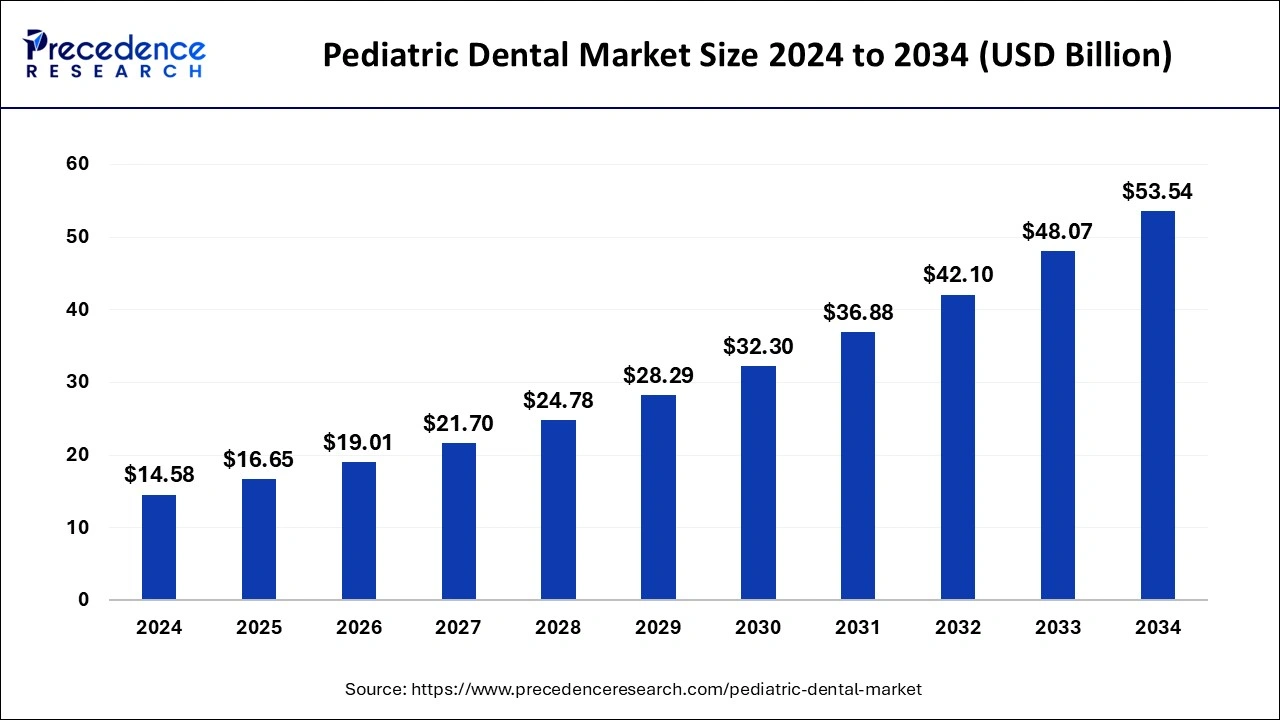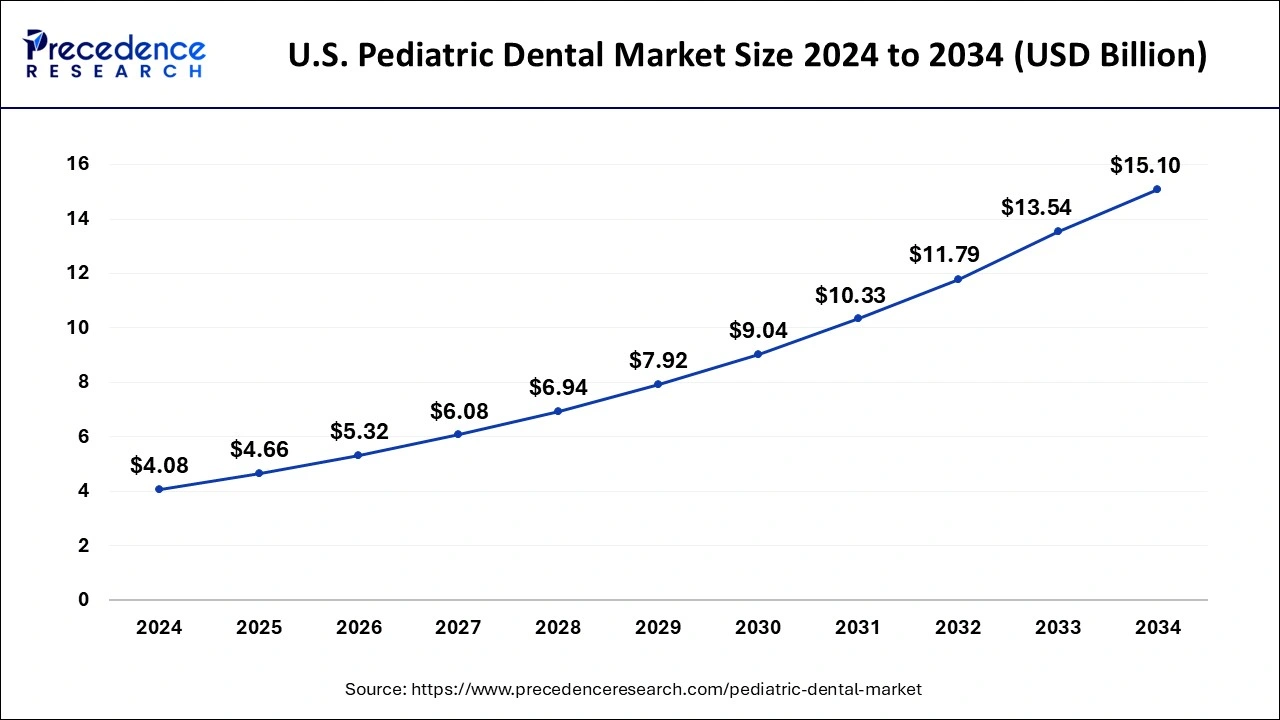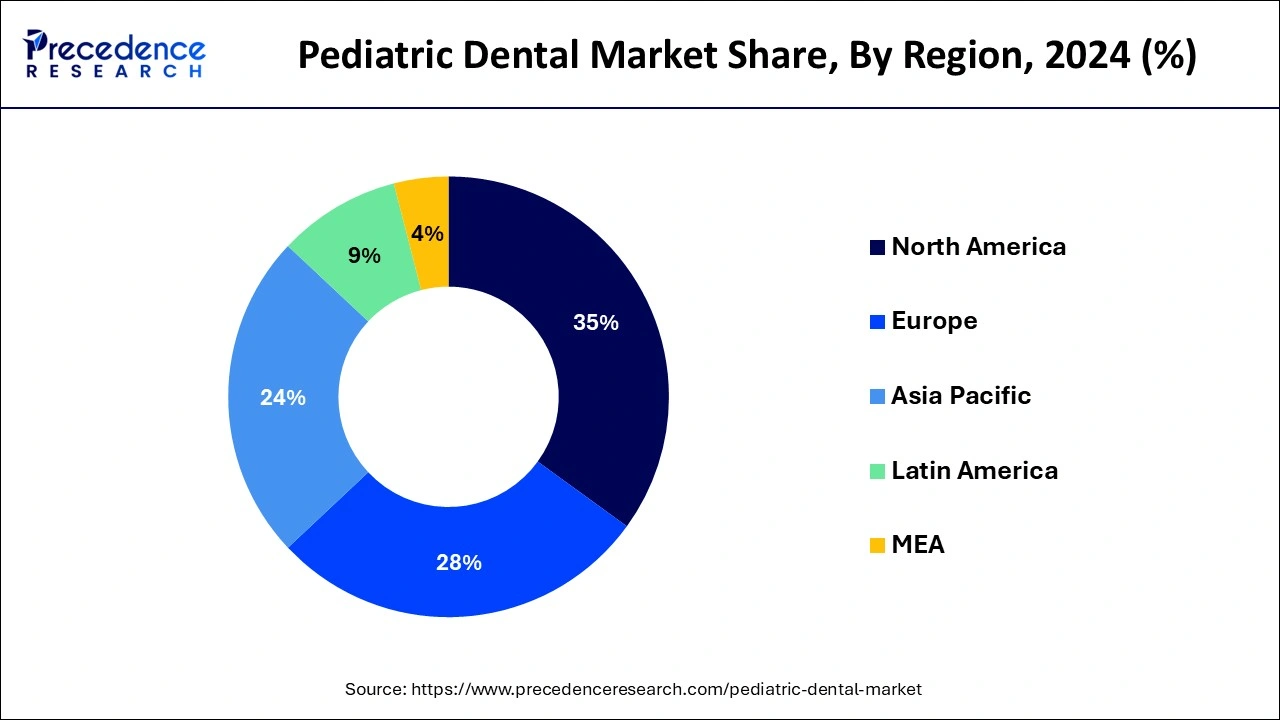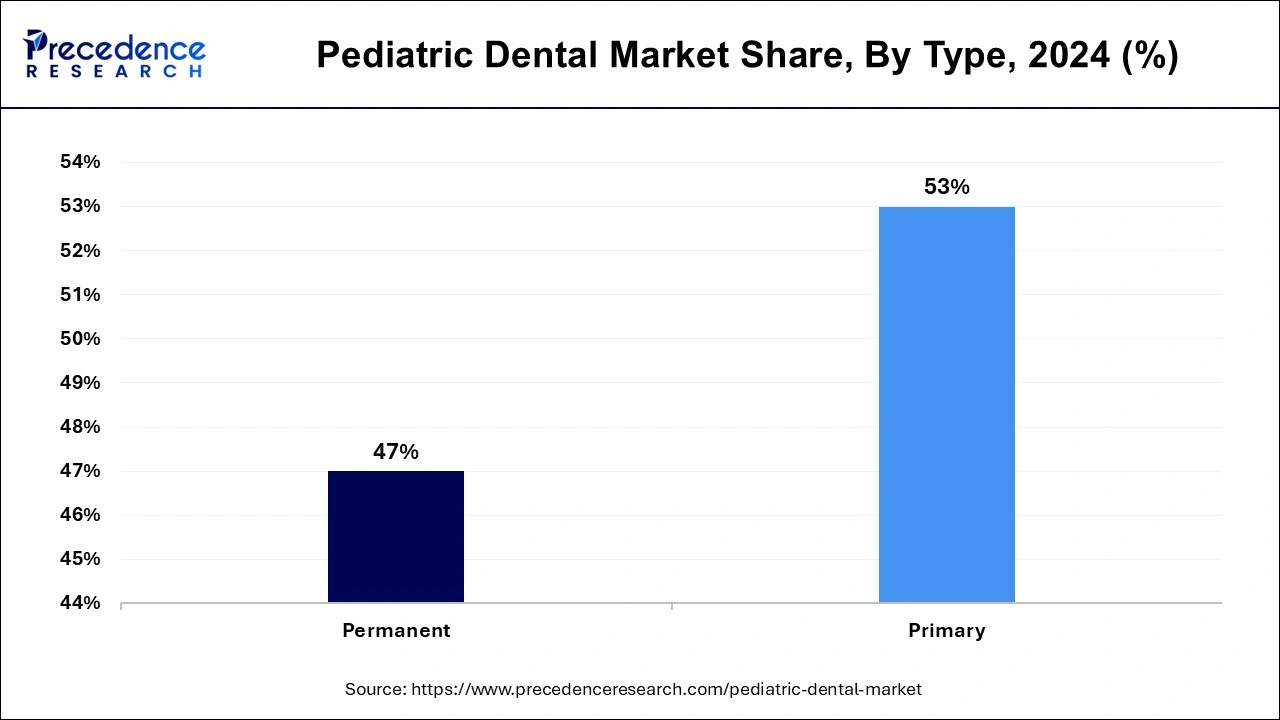Pediatric Dental Market Size and Forecast 2025 to 2034
The global pediatric dental market size was estimated at USD 14.58 billion in 2024 and is predicted to increase from USD 16.65 billion in 2025 to approximately USD 53.54 billion by 2034, expanding at a CAGR of 13.89% from 2025 to 2034. The rising prevalence of dental issues among young populations and a growing emphasis on preventive dental care are driving the market's growth seamlessly on a global scale.

Pediatric Dental Market Key Takeaways
- The global pediatric dental Market market was valued at USD 14.58 billion in 2024.
- It is projected to reach USD 53.54 billion by 2034.
- The market is expected to grow at a CAGR of 13.89% from 2025 to 2034.
- North America led the market with the largest market share of 35% in 2024.
- Asia Pacific is emerging as a fast-growing hub in the global market.
- By type, the primary teeth segment has held the largest share of 53% in 2024.
- By type, the permanent dental treatment segment is experiencing rapid growth within the market.
- By disease type, the dental caries segment accounted for the major market share of 37% in 2024.
- By disease type, the enamel disorder segment is rapidly gaining momentum within the market.
- By procedure, the dental cleaning-prophylaxis segment has contributed more than 32% in 2024.
- By procedure, the stainless-steel crown procedures segment is rapidly growing in popularity.
U.SPediatric Dental Market Size and Growth 2025 to 2034
The U.S pediatric dental market size was estimated at USD 4.08 billion in 2024 and is predicted to be worth around USD 15.10 billion by 2034, at a CAGR of 13.98% from 2025 to 2034.

North America stands out as a dominant force in the pediatric dental market, owing to several factors that contribute to its prominence. The region boasts a well-established healthcare infrastructure, including advanced dental facilities and a high concentration of pediatric dental specialists.
Along with this, growing awareness about the importance of oral health in children, coupled with rising disposable incomes, drives demand for pediatric dental services. Additionally, favorable reimbursement policies and widespread availability of dental insurance coverage further support the pediatric dental market growth in North America. Moreover, technological advancements in dental equipment and procedures are readily adopted in this region. It helps in enhancing the quality and accessibility of pediatric dental care.
With a robust regulatory framework ensuring high standards of patient care and safety, North America continues to lead the way in shaping the pediatric dental market globally. For instance, as per data published by Richmond Dental and Medical, around 196,000 dentists are available in the US solely due to the rising professional needs. Thus, Higher investments and fostering innovation are some of the driving factors for the excellence of the North American region in pediatric dental healthcare delivery.

Asia Pacific is emerging as a fast-growing hub in the global pediatric dental market, propelled by various factors driving its rapid expansion. Firstly, the region's higher population, particularly in countries such as China and India, presents a vast unexplored market for pediatric dental services. With increasing urbanization and rising disposable incomes, there's a growing awareness of the importance of oral health, leading to higher demand for pediatric dental care services.
Moreover, governments and healthcare organizations are increasingly focusing on preventive dental care initiatives, further boosting market growth. Additionally, advancements in dental technology and treatments are swiftly adopted in the region, again helping to enhance the quality and accessibility of pediatric dental services. Furthermore, the Asia Pacific region benefits from a rising number of dental clinics and skilled professionals catering to pediatric patients, thereby contributing to the market's rapid expansion. As a result, Asia Pacific is positioned as a dynamic and promising market, offering significant growth opportunities for stakeholders in the pediatric dental market.
Market Overview
The pediatric dental market is witnessing steady growth due to increasing awareness about oral hygiene in children and the rising prevalence of dental issues among young populations. With a growing emphasis on preventive dental care, parents are seeking specialized dental services for their children from infancy through adolescence.
Technological advancements in dental equipment and procedures are also driving market expansion, enabling more accurate diagnoses and less invasive treatments. Additionally, government initiatives promoting pediatric dental health and the availability of insurance coverage for pediatric dental procedures are further fueling market growth. However, challenges such as limited access to pediatric dental services in rural areas and the high cost of specialized treatments may hinder market progression. Despite these challenges, the market shows promising opportunities for innovation and investment, particularly in areas such as tele dentistry and digital dental solutions tailored for pediatric patients.
Pediatric Dental Market Growth Factors
- Increasing awareness about oral hygiene in children.
- Rising prevalence of dental issues among young populations.
- Growing emphasis on preventive dental care.
- Technological advancements in dental equipment and procedures.
- Government initiatives promoting pediatric dental health.
- Availability of insurance coverage for pediatric dental procedures.
Market Scope
| Report Coverage | Details |
| Growth Rate from 2025 to 2034 | CAGR of 14.17% |
| Market Size in 2025 | USD 14.58 Billion |
| Market Size by 2034 | USD 48.07 Billion |
| Largest Market | North America |
| Base Year | 2024 |
| Forecast Period | 2025 to 2034 |
| Segments Covered | By Type, By Disease Type, and By Procedure |
| Regions Covered | North America, Europe, Asia-Pacific, Latin America, and Middle East & Africa |
Market Dynamics
Driver
Innovations in pediatric dentistry
Significant advancements in dental technology propel forward the pediatric dental market. Innovations such as digital imaging systems, 3D printing for customized dental appliances, and minimally invasive treatment techniques are revolutionizing pediatric dental care. These technologies enhance the accuracy of diagnoses, improve outcomes, and reduce patient discomfort. Thus increasing the demand for pediatric dental services.
Technological advancements have made the workflow processes for dental professionals more efficient and productive, especially in pediatric dental practices. For example, early cavity detection has become more accessible, faster, less invasive, and affordable, which helps dentists preserve the baby's tooth until it falls out on its own. This helps maintain the child's oral development. As these technologies continue to evolve and become more accessible, they are expected to drive further growth and innovation in the global pediatric dental market.
Restraint
Limited access to dental services
A significant challenge facing the pediatric dental market is the limited access to dental services for children living in rural and underserved areas. Accessibility barriers such as geographic remoteness, shortage of pediatric dental specialists, and inadequate infrastructure to treat dental discomfort contribute to hindrances in oral health outcomes among pediatric populations. As a result, many children in rural areas face difficulties in accessing timely dental care. It is leading to untreated dental conditions, and insufficient oral health information causes poor outcomes, especially in rural areas. Addressing this issue requires concerted efforts from policymakers, healthcare providers, and community organizations to improve the distribution of pediatric dental services and promote oral health equity among all children, regardless of their geographic location.
Opportunity
Tele-dentistry and digital technology
One significant opportunity in the pediatric dental market is the expansion of tele-dentistry and digital dental solutions. Tele-dentistry enables remote diagnosis, consultation, and treatment planning through digital communication technologies, providing a convenient and accessible option for children, particularly those in rural or underserved areas.
Additionally, digital dental solutions, such as installing mobile applications for oral hygiene education, virtual reality simulations for dental anxiety management, and electronic health records for streamlined patient management. These are some innovative ways to enhance pediatric dental care delivery and patient engagement. By harnessing the power of tele-dentistry and digital technologies, pediatric dental practices can overcome geographical barriers. With the help of tele-dentistry, improvisation of operational efficiency and delivering high-quality care fabricated to the unique needs of pediatric patients will be a priority. Thereby unlocking new avenues for growth and innovation in the pediatric dental care market.
Type Insights
The primary teeth segment held the largest share of the pediatric dental market in 2024. The growth of this segment can be related to the rising dental problem known as malocclusion. Major dental problems that are seen in the younger ones are mostly related to the dental issue of malocclusion. Hence, the rising number of teeth disorders and treatments associated with them are fueling the segment's growth. Moreover, physical activities have been increased while learning to walk and run in toddlers, which again leads to dental trauma in toddlers. Anterior maxillary primary teeth are shown to have a maximum number of children who face trauma while going through this phase. Meanwhile, mandibular primary teeth are less traumatic than this one. Further, diseases like luxation and crown fracture are frequent ones of teeth injuries that are recorded by pediatric dentists. Hence, the rising teeth issues associated with dental trauma cause the proliferation of the primary teeth segment globally.

The permanent dental treatment segment is experiencing rapid growth within the pediatric dental market. As children's dental health becomes increasingly prioritized, there's a growing demand for long-term solutions to address dental issues. Permanent treatments such as dental implants, crowns, and orthodontic procedures offer durable solutions for pediatric dental conditions, including tooth loss, malocclusion, and structural abnormalities. Additionally, advancements in dental materials and techniques enhance the effectiveness and aesthetics of permanent treatments, driving their adoption among parents and caregivers seeking comprehensive and lasting solutions for their children's dental needs.
Disease Type Insights
The dental caries segment accounted for the largest share of the pediatric dental market in 2024. Dental caries, commonly known as tooth decay or cavities, affects a large proportion of children globally, leading to pain, discomfort, and potential complications if left untreated. Factors such as poor oral hygiene practices, consumption of sugary foods and beverages, and inadequate access to dental care contribute to the high incidence of dental caries among pediatric populations. Consequently, dental caries prevention and treatment services, including fluoride treatments, dental sealants, and restorative procedures, form a substantial portion of pediatric dental practices, driving the dominance of the dental caries segment in the market.
The enamel disorder segment is rapidly gaining momentum within the pediatric dental market. Enamel disorders encompass a range of conditions affecting the outer layer of teeth, leading to issues such as discoloration and structural abnormalities. Factors such as genetic predisposition, dietary habits, and environmental factors contribute to the prevalence of enamel disorders among children. With advancements in dental imaging technology and genetic testing, clinicians can now better identify and manage enamel disorders early, driving the demand for specialized treatments and preventive measures targeted at preserving pediatric dental health.
Procedure Insights
The dental cleaning-prophylaxis segment was estimated to hold the highest share of the pediatric dental market in 2024. Dental cleaning, also known as prophylaxis, is a fundamental procedure in pediatric dental care, characterized by the removal of plaque, tartar, and stains from teeth surfaces. This preventive procedure plays a crucial role in maintaining optimal oral health by preventing the buildup of harmful bacteria that can lead to dental caries and gum disease. During dental cleaning, dental professionals use specialized instruments to meticulously clean and polish teeth, promoting a clean and healthy oral environment. Regular dental cleanings are recommended for children to prevent dental problems and maintain a bright, healthy smile throughout their lives.
In the pediatric dental market, the stainless-steel crown procedures segment is rapidly growing in popularity. This is mainly due to their durability, cost-effectiveness, and versatility in treating pediatric dental issues, such as extensive decay or trauma. These factors contribute to their fast-paced adoption in pediatric dental practices.
Pediatric Dental Market Companies
- 3M
- Hu-Friedy Mfg. Co., LLC
- Kinder Krowns
- Figaro Crowns, Inc.
- Acero Crowns
- Sprig Oral Health Technologies, Inc.
- Edelweiss Dentistry Products GmbH
- SML
- Cheng Crowns
- Dentsply Sirona
Recent Developments
- In September 2023, data was published, which shows that a systematic search of PubMed, LIVIVO, and Ovid was conducted up to March 2021. These databases were searched for relevant clinical studies on periodontal treatment success in individuals with Papillon-Lefèvre syndrome (PLS). According to the end results of this study, the timely extraction of affected or all primary teeth, compliance with oral hygiene instructions, supra- and subgingival debridement within frequent supportive periodontal care intervals, and adjacent systemic antibiotic therapy in most patients affected a halt or pause in disease progression.
Segments Covered in the Report
By Type
- Primary
- Permanent
By Disease Type
- Dental caries
- Enamel disorders
- Others
By Procedure
- Pulpotomies
- Stainless steel crowns (SSCs)
- Tooth-coloured fillings
- Dental cleaning (prophylaxis)
- Others
By Geography
- North America
- Europe
- Asia Pacific
- Latin America
- Middle East and Africa
For inquiries regarding discounts, bulk purchases, or customization requests, please contact us at sales@precedenceresearch.com
Frequently Asked Questions
Ask For Sample
No cookie-cutter, only authentic analysis – take the 1st step to become a Precedence Research client
 Get a Sample
Get a Sample
 Table Of Content
Table Of Content
 sales@precedenceresearch.com
sales@precedenceresearch.com
 +1 804-441-9344
+1 804-441-9344
 Schedule a Meeting
Schedule a Meeting